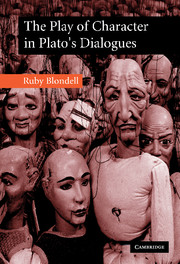Book contents
- Frontmatter
- Contents
- Preface
- 1 Drama and dialogue
- 2 The imitation of character
- 3 The elenctic Sokrates at work: Hippias Minor
- 4 A changing cast of characters: Republic
- 5 Reproducing Sokrates: Theaetetus
- 6 Putting Sokrates in his place: Sophist and Statesman
- Bibliography
- General index
- Index of passages cited
2 - The imitation of character
Published online by Cambridge University Press: 22 September 2009
- Frontmatter
- Contents
- Preface
- 1 Drama and dialogue
- 2 The imitation of character
- 3 The elenctic Sokrates at work: Hippias Minor
- 4 A changing cast of characters: Republic
- 5 Reproducing Sokrates: Theaetetus
- 6 Putting Sokrates in his place: Sophist and Statesman
- Bibliography
- General index
- Index of passages cited
Summary
The various functions of dialogue form considered in the last chapter are all complementary and mutually reinforcing. And all are inextricably bound up with Plato's use of characterization. By this I mean simply his discursive strategies for the representation of persons, which may be summarized as what they say and what others say to them or about them, together with the dramatic context in which they are situated through the discourse as a whole. The entire text of a Platonic dialogue may thus be understood as a vehicle for characterization. In this chapter I hope to substantiate this claim, as well as exploring several related matters concerning various conceptions of “character.” I begin by examining the various components of a person's “character” and the distinction between this meaning of the word and “character” as dramatis persona. In the next section I look in greater detail at the “maximal” Sokrates who emerges from Plato's dialogues overall. Finally, I outline some ancient Greek attitudes towards the construction of character in and through dramatic representation, as a matrix for considering how Plato may have expected his characters to influence his audience, and a context for understanding some of the dramatic strategies to be considered later in more detail.
“character”
When Aristotle says drama represents “people doing things,” he adds that these people are “necessarily” of good or bad character (ēthos). One might object that some representations of persons endow them with no moral qualities.
- Type
- Chapter
- Information
- The Play of Character in Plato's Dialogues , pp. 53 - 112Publisher: Cambridge University PressPrint publication year: 2002



